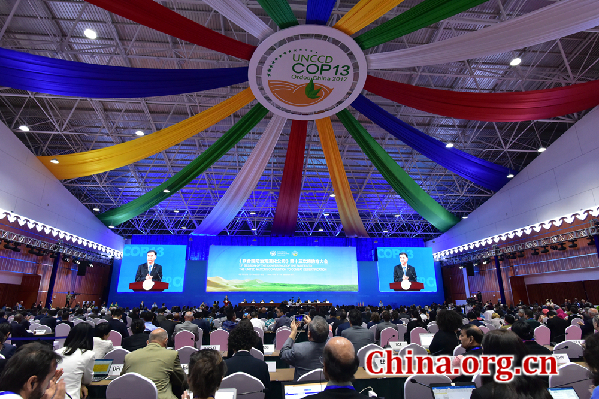With President Xi Jinping stressing international cooperation on Monday to combat desertification, more countries have agreed to act in an unprecedented global campaign to conserve productive land.
|

|
|
A high-level meeting of the 13th Session of the Conference of the Parties (COP13) to the United Nations Convention to Combat Desertification (UNCCD) opens in Ordos, Inner Mongolia Autonomous Region, Sept. 11, 2017. [Photo by Han Lin/China.org.cn]
|
During a high-level meeting of the 13th Session of the Conference of the Parties (COP13) to the United Nations Convention to Combat Desertification (UNCCD) in Ordos, Inner Mongolia, Vice Premier Wang Yang read a letter by Xi to the conference, with the theme of “Combating Desertification for Human Well-being,” which intends to develop a new strategic framework for the UNCCD and will be significant for guaranteeing global ecological security.
António Guterres, secretary-general of the United Nations, also sent a video message to the meeting. “Healthy and productive land is a foundation for dignity and prosperity. The planet’s limited land resources are under growing pressure. Climate change, land degradation and drought threaten food security and stability and the well-being of societies,” he said.
“The solution is to assess resilience and promote inclusive and sustainable development,” he pointed out, “That means better managing land, rehabilitating what has been lost, and being better prepared for droughts and the challenges of a warming planet. I encourage you to be bold. And the world looks to the UNCCD parties to deliver an ambitious and practical strategy for alleviating land degradation and desertification.”
Wang said over the coming decades that China will place an emphasis on combating desertification as an important part of the development of the ecological civilization, work and communicate comprehensively with the international community, and strive to explore a path of desertification control with Chinese characteristics.
Liu Dongsheng, vice minister of the State Forestry Administration said in a press conference held later that China has done a remarkable job in combating desertification and over the past few years has restored more land than has degraded. Deserts have gone from expanding annually by 10,400 square kilometers at the end of the last century in China to reducing by 2,424 square kilometers. This year, the country has restored over 1,000 square kilometers above the net balance. Liu added that China will handle 50 percent of manageable desert by 2020 and restore all of the manageable desertified land by 2050.
But as Xi noted in the letter, land desertification is a major ecological issue affecting the existence and development of mankind, and the situation for controlling desertification remains grave despite the progress the world has achieved since the UNCCD came into effect 21 years ago.
According to the UNCCD, up to 2 billion hectares of land are degraded. On average, 12 million hectares are lost every year and 169 countries are affected by land degradation, desertification and drought. China, Brazil, Russia, India, Nigeria and South Africa have committed to the national targets in a move that could see over 1.3 billion of the mostly poor people regaining food, water, energy and job security. Conservative estimates put the cost of land degradation globally at US$297 billion per year.
Under the Land Degradation Neutrality: The Target Setting Program spearheaded by the UNCCD and supported by 17 international partners, 112 countries have agreed to make the United Nations Sustainable Development Goals target of achieving land degradation neutrality by 2030 a national target for action to conserve productive land. More than 60 of these countries have already established national land degradation baselines and set neutrality targets.
Desertification, land degradation and drought are now recognized as threats to global security due to their impacts on livelihoods tied to the productivity of land. This year, drought led to the worst humanitarian crises since World War II. Migration driven by desertification is expected to reach 60 million by 2045, it was revealed at a ministerial meeting held later on Monday, where more than 80 ministers from all over the world discussed pursuing land degradation neutrality.
“The population is growing at an extra 200,000 people every day, while 20 countries have declared drought emergencies in the last 18 months alone. We are clearly not sufficiently prepared for these challenges. Hundreds of millions of people go to bed desperate, hungry and thirsty as a result. Under business as usual scenarios, there is no future relief,” said Monique Barbut, executive secretary of UNCCD.
She said the Convention, at its current Conference, “can offer the poor a new deal. By using our land resources rationally and acting before it is too late, there is enough for everyone to live well…We can be better prepared for drought and offer stable, green and land-based employment and development for millions of rural people. We can promote harmony between city and country and offer opportunity for all.”
About 1,400 delegates from 196 parties and more than 20 international organizations attended the 13th Session of the Conference of the Parties to the UNCCD from Sept. 6 -16.
read more


